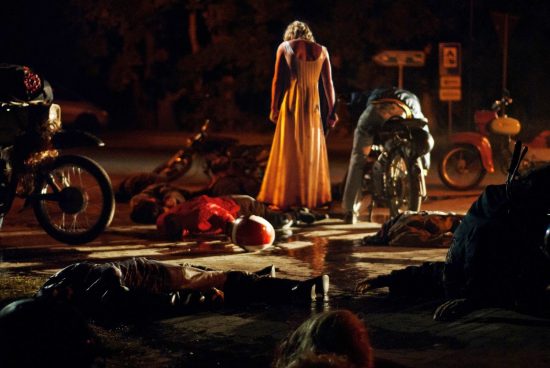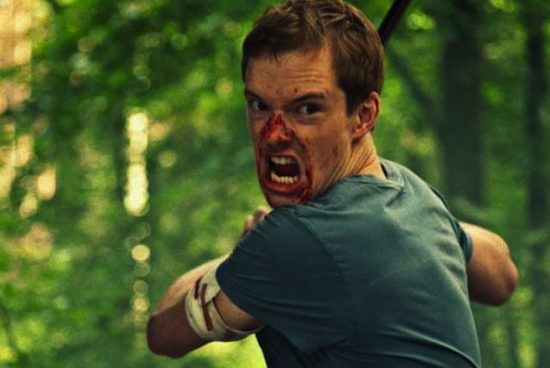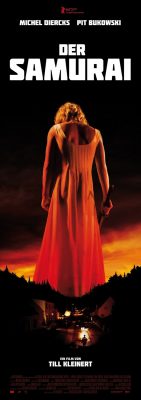Director Till Kleinert talks to Live for Films about Der Samurai
 Young, small town cop, Jakob (Michel Diercks) is trying to protect his German village from a wolf that is prowling the surrounding woods. One night he encounters a mysterious stranger, Der Samurai (Pit Bukowski). Clad in a white dress, and brandishing a razor sharp sword, the samurai is intent on wreaking destruction on Jakob’s homestead.
Young, small town cop, Jakob (Michel Diercks) is trying to protect his German village from a wolf that is prowling the surrounding woods. One night he encounters a mysterious stranger, Der Samurai (Pit Bukowski). Clad in a white dress, and brandishing a razor sharp sword, the samurai is intent on wreaking destruction on Jakob’s homestead.
Desperately trying to catch and halt the mysterious and elusive warrior, Jakob will not only have to confront the samurai, but the members of his village that are holding him down, and even himself and his own sexuality. Scares, thrills, mystery and wonderfully choreographed carnage abound in writer-director-editor Till Kleinert’s film that I really dug at last year’s FrightFest and described as “a gay Let the Right One In”.
Der Samurai is released in the UK on VOD and DVD on the 13th of April. Before that, there is also a very special screening at the Prince Charles Cinema on Thursday the 9th of April, with Till in attendance. Till will not only be introducing his film and answering your questions after, but also showing some of his favourite trailers, giving away freebies, and signing pre-release copies of the film. You can get tickets here.
I caught up with Till to talk about sword play, stunt cocks and death by pagan cult.
Hello, this is Alan from Live for Films.
Hellooooooo.
Hi, Till. How’s it going?
I am fine.
Excellent. I’ve been hoping that I’d get to talk to you since I saw The Samurai at FrightFest last year.
Oh. OK. Cool. So did you enjoy it?
I did. I really enjoyed it.
That’s good.
It’s a unique and wonderful film, and I was wondering where you got the idea for it from, and what the core message that you were trying to convey with it was?
Yeah. Alright. Well usually it doesn’t start with a message or an agenda for me. I think these kinds of things develop naturally, while developing the film. Like with all of my films so far, it started with a central image that is very striking. It is usually in the shape of some lucid daydream, or whatever! Then writing the script is an exploration of that image and what it actually means. In this case it was the lonely hero wearing the dress and rattling a sword along a fence on an empty street in a village in the fog.
This came to me when I was travelling by train, at nightfall. It was a very moody sort of atmosphere, and the train track was also a bit elevated – so you were looking down on the houses and the little hamlets, and they almost had a sort of miniature quality to them, you know? Very small, very huddled together. It almost looked like the houses were bracing themselves against some sort of perceived threat from the dark of the woods around them. [laughs]
He came pretty much fully formed. He had this muscular shape, and this dress… Also when trying to write the story, it’s like trying to analyse a dream that you’ve had. So I had to start figuring out why he’s wearing a dress, why he’s got a sword, and who he’s coming from, and what it is about this character that people are afraid of in this environment. These kinds of things. Then it gets pretty personal actually. For example, when I developed this character Jakob as this sort of opposing character to this samurai, there’s a lot of me in him, in Jakob, at a certain time in my life. So, yeah.
I think even thought he film has the outward shape of a horror film, to me it’s more a story of facing stuff that has been oppressed, or suppressed, sort of, and then liberation. So it actually has a positive message to me.
Yeah. Me too. Is it true that Samurai is a thesis film?
Yeah. It’s my graduating film.
[sort of kidding] Can you tell me what grade you got for it?
[amused] We don’t get grades. In Germany we have this thing, “Baldauf” school, we are basically a school without grades. We are a very [laughing] I don’t know, “artistic”, open-minded school. I think it was generally well received. Instead of a grade, what we do is you have to present your film once it’s finished to all the teachers and students, and then there is a discussion that happens after the screening. It can be a very positive or quite negative experience depending on how well the film is received!
Cool. Obviously you wrote directed and edited Samurai. Was it particularly gruelling taking the lead in every stage of production, or was that complete control exactly what you wanted?
I wouldn’t have it any other way. I can’t say that it’s a very healthy – to obsess over every little detail of a film – but for some reason, I’m just wired like that. I can’t stop it. Also, for example, editing is my favourite part of the process, so I wouldn’t want to give that away to someone else!
Being on set, as a director, sometimes it’s an instinctive thing. You don’t have a real reason why something should be like that – you just feel like it’s that way, and since you don’t have any reasoning behind it, you couldn’t give the job to anyone else to try and make it happen. For me, that is actually the most stressful time. Being on set is the part I like the least. It’s fun working with the actors, but the stress and having the money run through your hands by the minute, and not having too much time to think things over or second guess yourself.
So I like editing a lot more. When you already have the material and can see, and can take your time to see what works, and which way, and how you can connect it. That’s my favourite part of it.
So, for future films, would you rather be an editor then?
Oh, no. Not at all. Because I feel like… I like editing my own stuff! I would rather say “I like all the steps, but the editing is when I feel closest to achieving what I was trying to achieve. I feel more like I would not use the term “director”, but “film maker” I see myself more as a film maker. Someone who just wants to make the film happen and will take any measure needed to get it done the way it should be done.
I know it’s a very… It’s slightly, how you say, “megalomaniac”, in a way! To think that your vision, or whatever you want to call it, is so strong that you are the only one who could pursue it!
I suppose… But in film making, you can get away with it, because you can call yourself “an auteur”.
Yeah. Exactly! I think I can get away with it as long as the films are quite smallish. As you said, the film is quite special, very specific… I don’t know… Unique, maybe? Whatever. It has these sorts of qualities because it is based on one voice that’s trying to convey something. Which is a quality that I generally like in films.
That doesn’t mean, of course, that you don’t have collaborators who you trust, and whose vision you trust and want to feature in the film as well.
You touched on this a little bit already, but I wanted to talk to you about the look of the samurai. You said that the image came to you fully formed, but how much research did you go into to find just the right sword, and just the right dress, and it’s colour and cut?
The sword was not that complicated actually. First of all, our budget being limited, there were… There are very beautiful, uniquely crafted, Japanese katana’s which would have maybe given even more character to the guy, but that would have been unaffordable to us. So it is one that is serialised, you know? It’s a reproduction, but it still looks right – it still has the right lines. A friend of ours is a weapons specialist, it’s one of his pet subjects, who helped us a lot to find the right one.
The dress was much more difficult actually. The colour was pretty clear from the get-go. It should be very bright because we wanted the samurai to have this sort of quality of a deer in the headlights or something. Whenever he gets caught by the flashlight it should be a very bright, almost over lit… You should be almost blinded by the… So it definitely had to be white. But it’s tailor-made. It’s made by our costume designer. It’s not a dress you can actually buy. Because on the one hand, the impression that you should have is that it’s just something that he found in that house and put on; and there are no women’s dresses that are made for his particular shape.
He was supposed to look very sexy in it all the time, but the waist was up way too high usually – so he always looked pregnant or something – so we had to lower the waistline quite a bit. No actual woman’s dress has a waistline that is that low. The other thing was how much of the back do you want to show? You want to have the shoulders, and this impression of very broad shoulders, because strangely enough we also wanted to emphasis his masculinity. But finding that sweet spot meant we often went off in completely different directions. At one point it looked more like a toga, or something!
Michel (Diercks) and Pit’s (Bukowski) dance on the football pitch is one of my favourite scenes in the film, it’s ethereal and beautiful…
Mine too! It’s mine too.
…who choreographed that, and did you try it with any other kinds of dances?
The funny thing is it’s completely un-choreographed. It’s Pit following Michel’s lead. I knew that Michel could do it because it’s one of the things we did during casting. It was always very important that this dance comes from deep within and is something very personal to Jakob. To me, he was always the kind of guy who would never ever dance in public, who was way too uptight to openly explore his sensuality. But maybe, when he’s at home, he would dance to music that no one else can really dance too.
So we did thing in casting where I played a song for him that he didn’t know, which was “Into the Night” from the Twin Peaks soundtrack. It’s very beautiful. It’s very haunting, but it’s not very rhythmical. It’s not something you can dance to. It was so impressive to see him convey this sort of bottled up sensuality that’s slowly emerging. So I knew. It was also a bit of rehearsal on set for how Pit would follow his lead, and that’s it. So there was not much choreography going on, I think Michel instinctively knew what was called for in that scene.
That’s nice. Did you have the two of them do much sword training before they got their hands on the katana, or did you want it to seem a bit more… feral?
It’s sort of both. On the one hand, I wanted it to seem very feral, but still Pit had a lot of training just to build up physical confidence with it. He became quite good actually. There’s only one scene of proper swordplay, which is the scene that’s upside down, you know?
Yes, yes.
And that’s him, that’s Pit. That’s not a stunt man. That’s something that he was actually very proud of, that he got this fight choreography right. So he was very good with a sword. Better actually than we let on in the film. Michel didn’t have any training. He only has the sword right at the very end. He’s a trained actor, so he has some sword training in class, but still it was more like making it look instinctive.
Like the dance, for example, I’m very grateful that you mentioned that that’s your favourite scene because for me that’s the core of the film. Often people ask me, “With the dance, weren’t you afraid that it would become ridiculous?” Not at all. This is the thing, when there is a chance of it becoming ridiculous this is where I feel the most at home and here the film needs to be. I have fears of scenes that could be regarded as standard, you know?
Fair enough. I have to ask… was that Pit’s own penis at the end of the film, or did you get a stunt cock in?
Oh, no. It’s his, it’s his. Of all the special effects in the film that was the hardest to pull off…
Ohhhhhh.
Haha. Yeah. [laughing] Sorry, I just had to. It’s real but we had to try three times actually!
Was it cold in the forest?
It was cold and there was meat [from earlier in the scene], it was off-screen, but it was where we shot it and it rotted pretty fast and attracted flies, so it was not a very comfortable situation for him!
Eurgh.
We had some pills as well, to help it! Not actual Viagra, because we couldn’t afford it, so his face turned red but nothing else happened! So it took three goes, but luckily it was a location that we could return to. But he never once questioned the need for that. You would maybe expect a lesser actor to try and talk their way out of doing that.
Yeah. No. It’s a fearless thing to do.
So it was frustrating for him when it didn’t work the first two times, but eventually it did so I’m very grateful to him and his openness. It’s a quite generous thing to do actually.
Do you mind me asking what you’re doing next?
No! Not at all! There’s nothing green lit, but I have been working on a horror mystery television programme. It’s called “Hausen”. Which is a funny word. It’s actually a verb that means to dwell somewhere, but not like “living”. If you have no choice but to live somewhere then you are “hausen”. But it’s also a suffix to describe a village, like “ville”.
It’s about… it takes place in a tower block, in a former socialist realist tower block that’s very run down, and it’s about the people who live there, and something else that lives there in the building with them that they are not aware of… It’s going to be a fantastic series, I just hope it happens. I don’t want to jinx it!
No. Heaven forbid. If you could remake any film, which would it be and why?
I don’t think it needs a remake, it’s one of my favourite films, but The Night of the Hunter. Because the, the innocence of the kids fleeing from the preacher that is offset by so much mythical, fairy tale-ish horror, and I feel like it could be put in a more naturalistic environment, like former eastern Europe or something… The kids fleeing from some kind of foster parent perhaps… It could be very nice. A sort of mythical metaphysical thriller… I think it could be very beautiful actually.
That’s a great idea. My last question for you is… If you could be killed by any movie monster…
[laughs]
…which one would it be, and what would your last words be?
Oh God! Oh my! I don’t know… Is there any movie monster where you die having sex, or something like that?
Well a lot of the slashers do that, don’t they?
I have to admit, I don’t want to be killed. I think I would want someone that would do it fast, so maybe Jason – just take the machete and get it done.
[laughs]
I think villains… I have more sympathy for, and I would just like to be able to help them. In a way, I sympathise so much with them… I think I would actually rather a sort of pagan cult, I like their sort of libertine lifestyle – I guess I would be willing to let them sacrifice me, if they had a way to make it sort of painless.
OK! So not Jason after all, but a pagan cult, as long as they could make it quick and painless. Would you have last words for these pagans at all?
“I regret nothing”.
Classic. Thank you, Till. I’ve really enjoyed talking to you. I hope Samurai does well, and I look forward to hopefully seeing Hausen at some point in the future!
Yeah, that’s be great. I hope if it gets made it travels as well. Thank you, thank you very much. I’m glad that you enjoyed the film, and let’s see how it does. If people want to come and see the film, there is a screening at the Prince Charles Cinema. There will be a Q and A, but lots of funny shenanigans too – it’s being put on by the Duke Mitchell Film Club.
I will let the people know, and I will see you there. Thanks, Till.
Der Samurai is released in the UK on demand and on DVD on the 13th of April.
The screening with Till Kleinert is at the Prince Charles Cinema, Leicester Square, on the 9th, and tickets are available here.












